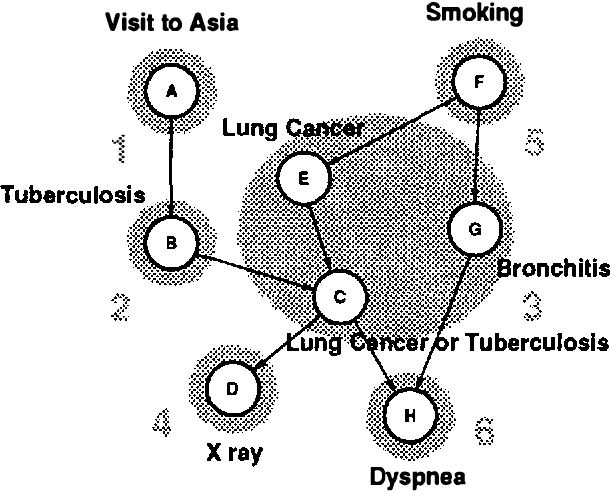Jaswinder Pal Singh
Probabilistic Constraint Satisfaction with Non-Gaussian Noise
Feb 27, 2013


Abstract:We have previously reported a Bayesian algorithm for determining the coordinates of points in three-dimensional space from uncertain constraints. This method is useful in the determination of biological molecular structure. It is limited, however, by the requirement that the uncertainty in the constraints be normally distributed. In this paper, we present an extension of the original algorithm that allows constraint uncertainty to be represented as a mixture of Gaussians, and thereby allows arbitrary constraint distributions. We illustrate the performance of this algorithm on a problem drawn from the domain of molecular structure determination, in which a multicomponent constraint representation produces a much more accurate solution than the old single component mechanism. The new mechanism uses mixture distributions to decompose the problem into a set of independent problems with unimodal constraint uncertainty. The results of the unimodal subproblems are periodically recombined using Bayes' law, to avoid combinatorial explosion. The new algorithm is particularly suited for parallel implementation.
Sensitivities: An Alternative to Conditional Probabilities for Bayesian Belief Networks
Feb 20, 2013


Abstract:We show an alternative way of representing a Bayesian belief network by sensitivities and probability distributions. This representation is equivalent to the traditional representation by conditional probabilities, but makes dependencies between nodes apparent and intuitively easy to understand. We also propose a QR matrix representation for the sensitivities and/or conditional probabilities which is more efficient, in both memory requirements and computational speed, than the traditional representation for computer-based implementations of probabilistic inference. We use sensitivities to show that for a certain class of binary networks, the computation time for approximate probabilistic inference with any positive upper bound on the error of the result is independent of the size of the network. Finally, as an alternative to traditional algorithms that use conditional probabilities, we describe an exact algorithm for probabilistic inference that uses the QR-representation for sensitivities and updates probability distributions of nodes in a network according to messages from the neighbors.
Computational Complexity Reduction for BN2O Networks Using Similarity of States
Feb 13, 2013



Abstract:Although probabilistic inference in a general Bayesian belief network is an NP-hard problem, computation time for inference can be reduced in most practical cases by exploiting domain knowledge and by making approximations in the knowledge representation. In this paper we introduce the property of similarity of states and a new method for approximate knowledge representation and inference which is based on this property. We define two or more states of a node to be similar when the ratio of their probabilities, the likelihood ratio, does not depend on the instantiations of the other nodes in the network. We show that the similarity of states exposes redundancies in the joint probability distribution which can be exploited to reduce the computation time of probabilistic inference in networks with multiple similar states, and that the computational complexity in the networks with exponentially many similar states might be polynomial. We demonstrate our ideas on the example of a BN2O network -- a two layer network often used in diagnostic problems -- by reducing it to a very close network with multiple similar states. We show that the answers to practical queries converge very fast to the answers obtained with the original network. The maximum error is as low as 5% for models that require only 10% of the computation time needed by the original BN2O model.
 Add to Chrome
Add to Chrome Add to Firefox
Add to Firefox Add to Edge
Add to Edge